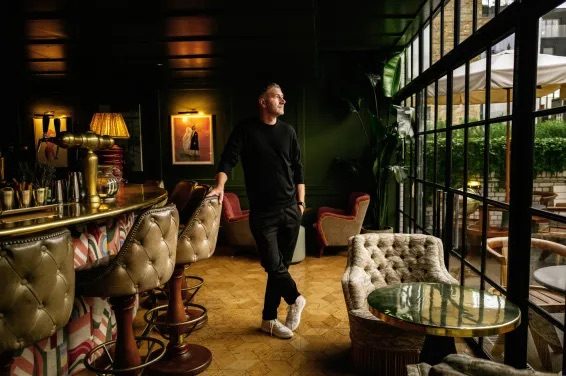Soho House, the London-based private members’ club empire boasting chains across the world, has been bought for £2 billion by American investors. Alongside more debt, which is unlikely to help the already cash-strapped business, the new Soho House has also added Hollywood actor Ashton Kutcher to its board.
While Soho House was only founded in 1995, it tapped into a more longstanding British need for social spaces with distinct identities. London’s private members’ clubs stand out as a relic of an age when membership and association were considered a fundamental part of British life. According to research by the Center for Democratic Business, the UK had over 4,000 members clubs in the Seventies; today, the total is less than half that.
Walk around any deindustrialized town or city in Britain and it’s easy to find buildings that used to be miners’ institutes, Conservative Clubs or branches of the Women’s Institute. Even golf clubs, a barometer of Middle England, have seen their memberships decline. Trade unions, pubs and nightclubs are all struggling according to research earlier this year by Power to Change. Associational life appears to be on life support, at a time when we need these spaces more than ever as concerns about social cohesion in our communities mount.
We have failed to sustain these institutions because the decent industrial employment that sustained them has gone. In May 1976, UK exports of goods comfortably outstripped exports of services. Today, we export 30% more services than we do goods. In 2021, creative and cultural industries made a total of £54.73 billion of exports, or 8.35% of total UK exports — more than double the figure from a couple of decades ago.
The irony is that Britain may have become a cultural and creative superpower, but it is struggling to keep hold of the very businesses that we have come to rely on to pay our way. Soho House is just part of over 1,000 mergers and acquisitions in the sector since 2013 from inward foreign investors. Cinema chain Curzon has been bought by private equity backed by the UAE. Film studios Bray Studios and See Saw Films have been bought by American and French companies respectively. Even clubland’s staple newspaper, the Daily Telegraph, has been purchased by US investors.
British leaders may think that creative and cultural industries are the country’s economic future, but it probably won’t own them. The profits they make will increasingly be sent overseas, along with the net £160 billion that has left the UK since 2010 and gone to foreign investors. To buy what we need from the rest of the world, we have to sell our most profitable assets, including our creative industries.
This reliance on services is a comforting story that we tell ourselves. We are “better” than other economies which must do the grubby trade of goods and raw materials. We are the global cultural elite. The truth is that we may have great cultural and creative power, but no major economy can live off private members’ clubs, films and newspapers. To keep our great cultural and creative businesses, we will have to put as much effort into rebuilding our homegrown industrial capacity as we do our creative industries. Alternatively, we can wait around for the news that Matt LeBlanc has just bought the Athenaeum.











Join the discussion
Join like minded readers that support our journalism by becoming a paid subscriber
To join the discussion in the comments, become a paid subscriber.
Join like minded readers that support our journalism, read unlimited articles and enjoy other subscriber-only benefits.
Subscribe